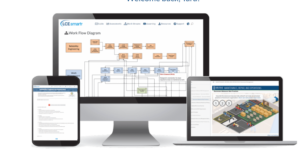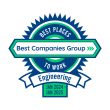By Rick Wheeler, Vice President of Professional Services at Life Cycle Engineering
As published in Manufacturing Technology Insights
Getting operations to run better, faster, cheaper, and safer isn’t easy. The promise of Industry 4.0 technology and its goal to simplify decision-making, improve operational efficiency and cut costs, have sent many manufacturers down the convoluted path of digital transformation. They know digital transformation offers a potentially substantial return on investment – and the risks of missing out competitively are too great to ignore.
Manufacturers might have a destination in mind (not always!), but they don’t always take the time to plan their route effectively. They invest significant time, money and resources in the process. But success rates are shockingly low; research suggests that 70 percent of digital transformation projects don’t succeed. So what can you do to increase the odds of success?
It starts with putting the foundational building blocks in place. Technology itself isn’t enough to get you to your goals. Your data, assets, processes, projects and reporting – all need to work together. It’s what we call a smart culture and the first step is recognizing that your people are your most important asset.
Shifting mindsets is key to success
Despite advancements in technology and the ambitious goals of digital transformation, most manufacturers have struggled to see any real productivity gains. Many companies tend to throw caution to the wind when it comes to their efforts – overly aggressive goals, with a lack of planning and preparation usually end in failure. But what if there was a way of operating that takes into account not just digital technology but the whole picture of your company’s operations? It might sound too good to be true….but it’s not.
By shifting the focus to encouraging a new mindset within the organization, we can better prepare and support workers while also putting good change management practices in place. When you establish a smart culture where people work in lockstep with their assets, you can truly begin to transform operations. It begins with the understanding that tools and technology alone aren’t enough to achieve digital transformation. Instituting best practices in order to better integrate and manage assets, internal processes, and people can help to achieve efficient operations, reduce costs, and improve reliability. Asset management is a key part of this equation. You’ll need to ask your operational team critical questions like:
1) How do we get more production/capacity out of existing assets?
2) How do we extend the life of assets?
3) When do we invest in new assets?
By shifting your focus from being reactive to proactive you can prevent breakdowns from happening in the first place. For example, you can have sensors monitoring equipment for potential problems. This creates more capacity and reduces capital investment by extending the life of the assets you already have. The results? You’re positioned to meet market demand, take more market share, and reduce costs all at the same time.
Organizational alignment starts at the top
People preparation involves putting good organizational change management practices in place. Leadership must be willing to set the vision for the future state, making sure it is clear, specific, and understandable. It requires working through what the changes mean for the organization and its culture, how roles will adapt, and how to prepare people.
For front-line personnel, it can be complicated. Transformation may sound exciting, but it can elicit concerns about skills adequacy, job security, and loss of control. Preparing your workforce for change is an important step in adopting a smart culture. Educating your workers in digital technologies can help them better understand the benefits of digital transformation. This includes training and skills development and may potentially require new talent acquisition, such as a reliability engineer or data scientist.
Establishing new best practices could include developing training documents for company processes, coaching in planning and scheduling techniques, or capturing data on a full season of repairs to plan for the next year. Define metrics for each step along the way and include guidance on how to apply advanced technologies. This can make the process more effective and efficient. Establishing key performance indicators can also help you evaluate how your people are learning, using, and improving your transformation initiatives. Once you learn how to apply best practices for a smart culture to your organization, you’ll find your workforce becomes more efficient.
The success of smart culture relies on people
Disrupted global supply chains, increasing costs, rising inflation, labor shortage. Need we say more? With all the challenges facing manufacturers today, the need to reduce costs, operate more efficiently, and extend the life of assets while also increasing operating capacity has never been more important.
Improving operational efficiency takes commitment from leadership, effective communication, and willingness to change. And without buy-in and support from your workforce, your digital transformation efforts have little hope of succeeding, resulting in a waste of considerable efforts, costs and resources.
But every cloud has a silver lining and just as engaged employees can break a company’s success, with the right direction, they can ensure its success too. Encouraging growth and supporting workers in learning new skills while engaging in their own development can create significant opportunities for your whole organization. To lessen the load, trusted partners can help fill the gaps. Tuning into the wisdom of experts in the field is a great way to fine-tune these best practices while helping to support in your creation of a smart culture.
The LCEsmartr team and tools provide flexible solutions to address your digital transformation needs. Whether you need:
- The hands-on support of experienced consultants;
- Access to the gold standard LCEsmartr playbook;
- Smart culture training through the Life Cycle Institute; or
- Help filling gaps in your current organization
LCEsmartr can accelerate your path to creating a smart culture.
Rick Wheeler is the vice president of professional services with Life Cycle Engineering (LCE). He works closely with the Reliability Consulting Group leadership team in developing LCE’s Industry 4.0 capabilities and services that leverage LCE’s thought leadership in asset management based on the ISO 55000 body of knowledge.

















